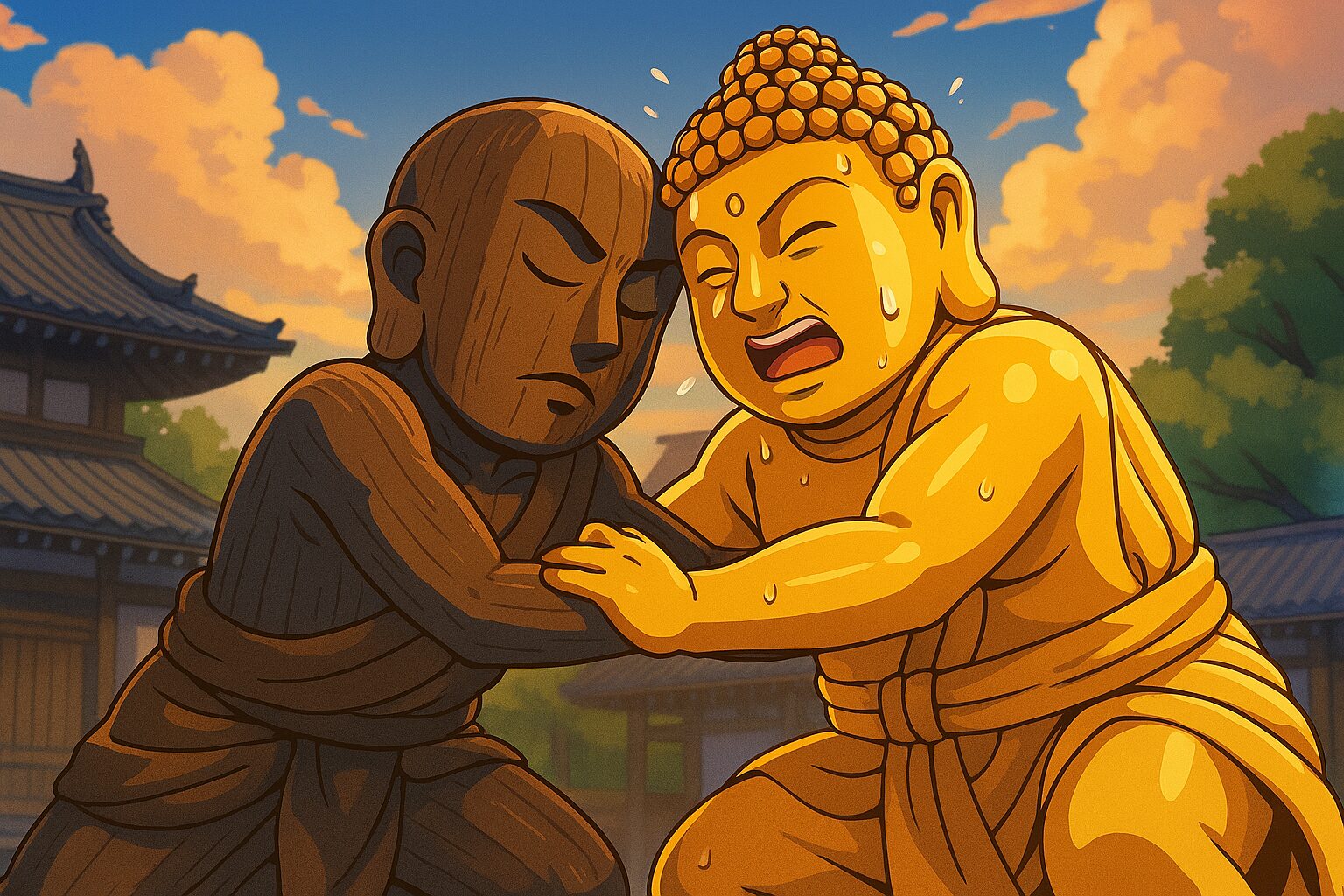This story is a companion piece to yesterday’s tale of the “Wooden Buddha Millionaire.” You can read the previous entry here: Wooden Buddha Series Archive
- Introduction: The Value of Faith in Japanese Folklore
- Setting the Stage: A Proud Landowner and a Humble Servant
- The Challenge: A Sumo Match Between Buddhas
- The Miracle: Buddhas Come to Life
- Reversal of Fortune: Faith Triumphs Over Vanity
- Lessons from the Tale
- For International Readers: What Is a “Buddha” in Japan?
- Related Reading
- Conclusion: A Tale of Heart Over Gold
- はじめに|日本の昔話に宿る「心の価値」
- 登場人物と舞台設定
- 金仏様 vs 木仏様|奇跡の相撲取り
- 土俵で動き出す仏様たち
- 運命の逆転|信仰がもたらす報い
- この物語が教えてくれること
- 海外読者への補足|日本の「仏様」とは?
- 関連リンク|もっと昔話を読みたい方へ
- おわりに|心の豊かさが人生を変える
Introduction: The Value of Faith in Japanese Folklore
Japanese folktales often teach us that true wealth lies not in appearance or possessions, but in the purity of one’s heart. Today’s story is a humorous yet profound tale featuring a golden Buddha statue, a wooden stick mistaken for a deity, and an unforgettable sumo match between the two.
Setting the Stage: A Proud Landowner and a Humble Servant
In a certain village, there lived a wealthy man known as “Chōja-don.” His pride and joy was a gleaming golden Buddha statue, which he polished daily and flaunted to every visitor.
Working in his household was a young servant tasked with heating the bath. Though poor, he was devout and grateful, having found a wooden stake in the mountains that resembled a Buddha. He treated it with reverence, carrying it with him and praying to it sincerely.
The Challenge: A Sumo Match Between Buddhas
One New Year’s Day, during a celebratory gathering, a guest suggested mocking the servant’s wooden Buddha. Chōja-don, amused, declared:
“Let’s have a sumo match between my golden Buddha and your wooden one! If yours wins, I’ll give you all my wealth and become the bath servant instead!”
The young man was troubled—how could he ask his Buddha to fight? But to his surprise, the wooden Buddha responded:
“Let’s do it. Don’t worry—I’ll be fine.”
The Miracle: Buddhas Come to Life
Placed in the ring, the two statues began to move. They wrestled fiercely, evenly matched at first. But gradually, the golden Buddha grew tired and sluggish. After a long and dramatic bout, the wooden Buddha emerged victorious. Chōja-don collapsed in disbelief.
Reversal of Fortune: Faith Triumphs Over Vanity
True to his word, Chōja-don handed over his estate, and the servant became the new master. The former landowner, now reduced to heating baths, complained to his golden Buddha:
“Why did you lose to a mere wooden stick?”
The golden Buddha replied calmly:
“You only polished me for show. You never truly believed. That’s why I had no strength to win.”
Lessons from the Tale
- Faith resides in the heart, not in appearances – The wooden Buddha was powerful because of the servant’s sincere devotion.
- Vanity weakens true connection – Chōja-don treated his Buddha as a trophy, not a spiritual guide.
- Gratitude and humility can change your fate – The servant’s pure heart led him to unexpected fortune.
For International Readers: What Is a “Buddha” in Japan?
In Japan, Buddhism has deep cultural roots. Buddha statues are not just religious icons—they represent gratitude, ancestral respect, and spiritual reflection. Families often keep small altars at home, and temples across the country house grand statues for worship.
This story contrasts a lavish golden Buddha with a humble wooden stake, showing that spiritual power comes from belief, not material beauty.
Related Reading
Conclusion: A Tale of Heart Over Gold
This folktale reminds us that faith and humility can lead to miracles. In a world obsessed with wealth and status, the story of the wooden Buddha offers a timeless lesson: polish your heart, not just your possessions.
【木仏長者・別話】金仏様と木仏様の相撲取り|信仰心が運命を変える日本昔話
※この記事は、昨日ご紹介した「木仏長者」の別話です。前回の記事はこちら: 木仏長者シリーズ一覧
はじめに|日本の昔話に宿る「心の価値」
日本の昔話には、見た目や財産よりも「心の在り方」が大切だという教訓が込められています。今回ご紹介するのは、そんな価値観をユーモラスに描いた「木仏長者」の別話。金色に輝く仏像と、山で拾った木の杭が相撲を取るという、奇想天外な物語です。
登場人物と舞台設定
物語の舞台は、ある地方の裕福な屋敷。そこには「長者どん」と呼ばれる金持ちの主人が住んでいました。彼の自慢は、仏壇に安置された金色の仏様。毎日磨き上げては、訪問客に見せびらかすのが日課です。
一方、屋敷で働く若者は風呂焚きの奉公人。身分は低いものの、心は清らかで信仰心に厚く、山で拾った木の杭を仏様として大切に拝んでいました。
金仏様 vs 木仏様|奇跡の相撲取り
ある正月の日、長者どんの屋敷では祝いの宴が開かれていました。客の一人が、若者の木仏をからかおうと提案します。
「長者どんの金仏様と、若者の木仏様で相撲を取らせてみようじゃないか!」
長者どんは面白がって乗り気になり、若者にこう言い放ちます。
「もしお前の木仏が勝ったら、ワシの身代を全部譲ってやる。ワシが代わりに風呂焚きになろう!」
若者は困り果てますが、木仏様は「やってやろうじゃないか。大丈夫・大丈夫」と答えました。
土俵で動き出す仏様たち
土俵に置かれた金仏様と木仏様。なんと、二体の仏像は動き出し、本当に相撲を取り始めたのです。最初は互角の勝負でしたが、次第に金仏様は息切れし、木仏様が勝利。長者どんは泡を吹いて倒れてしまいました。
運命の逆転|信仰がもたらす報い
約束通り、長者どんは若者に全財産を譲り、若者は新たな長者となりました。かつての長者は風呂焚きに落ち、金仏様に文句を言います。
「なぜあんな木のぼっくいに負けたのだ!」
すると金仏様は静かにこう答えました。
「お前は私を磨くばかりで、少しも信心しなかった。だから私は力を出せなかったのだ。」
この物語が教えてくれること
- 信仰は形ではなく心に宿る:木仏様は粗末でも、若者の信心によって奇跡を起こしました。
- 見せびらかすだけの信仰は空虚:長者どんは仏様を「自慢の道具」として扱っていました。
- 謙虚さと感謝が運命を変える:若者の心が、彼を長者へと導いたのです。
海外読者への補足|日本の「仏様」とは?
日本では、仏教が長い歴史を持ち、仏様(ほとけさま)は信仰の対象として大切にされています。仏像は寺院だけでなく、家庭の仏壇にも安置され、先祖供養や日々の感謝の象徴となっています。
関連リンク|もっと昔話を読みたい方へ
おわりに|心の豊かさが人生を変える
この「木仏長者・別話」は、信仰心の力と、謙虚な心がもたらす奇跡を描いた物語です。見た目や財産にとらわれず、日々の感謝と祈りを忘れないこと。それが、人生を豊かにする第一歩なのかもしれません。



コメント